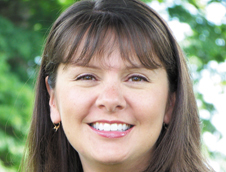
By Chrystal Johnson, Public Health Educator II
(Madison County, NY – Jan. 2016) The most important thing a woman can do to help prevent cervical cancer is to get screened regularly starting at age 21. Cervical cancer is highly preventable with regular screening tests and appropriate follow-up care. It also can be cured when found early and treated. The Pap test is one of the most reliable and effective cancer screening tests available. The Pap test detects cell changes on the cervix that might become cancerous if not treated properly.
Cervical cancer is almost always caused by the human papillomavirus (HPV).HPV is one of the most common sexually transmitted infections in the United States. Most often HPV will go away on its own, but if it does not, it could cause cervical cancer.
Vaccines are available to protect against the types of HPV that most often cause cervical cancer.
The HPV vaccine is given in a series of three shots. The Centers for Disease Control (CDC) recommends routine HPV vaccination for girls ages 11 to 12. Because the HPV vaccine can also protect against certain types of cancers in males, the CDC recommends that boys also get the HPV vaccine at age 11 to 12. If they are not vaccinated by this age, then catch-up vaccination begins at 13 years of age for both girls and boys.
Additionally, because research has shown that children ages 11 and 12 respond better to immunization and produce higher levels of antibodies that fight HPV infection compared to older children, the child’s annual visit for sixth grade when they receive their meningococcal vaccine and Tdap vaccine is the opportune time to start the three-dose HPV vaccine series.However, teens and young adults can still benefit from the HPV vaccine, which may be given until age 26.
What can you do? Talk to your doctor about the HPV vaccine,whether for yourself if you are 26 years old or younger, or for your child who is 10 years or older. Be sure to complete the three-dose series once started. The HPV vaccine is also available at Madison County Health Department Immunization clinics. Visit healthymadisoncounty.org or call 315-366-2848 for the clinic schedule or to book an appointment.
The second thing you can do is to get screened for cervical cancer. Routine screening for women aged 21 to 65 years old can prevent cervical cancer.If you are uninsured or underinsured, the Cancer Services Program of Madison, Oneida and Herkimer Counties (CSP), which is operated by the Oneida County Health Department, may be able to help provide important preventive cancer screenings at no cost to the patient. The CSP is funded by a grant from the New York State Department of Health, and offers routine cervical cancer (andbreast cancer) screenings to uninsured women ages 40 to 64. Call 315-798-5248 to find out if you are eligible.
Additional information about programs that promote early detection and treatment of cervical cancer is available at www.cdc.gov/cancer. For more information on the Madison County Health Department’s programs and services, visit www.healthymadisoncounty.org.

